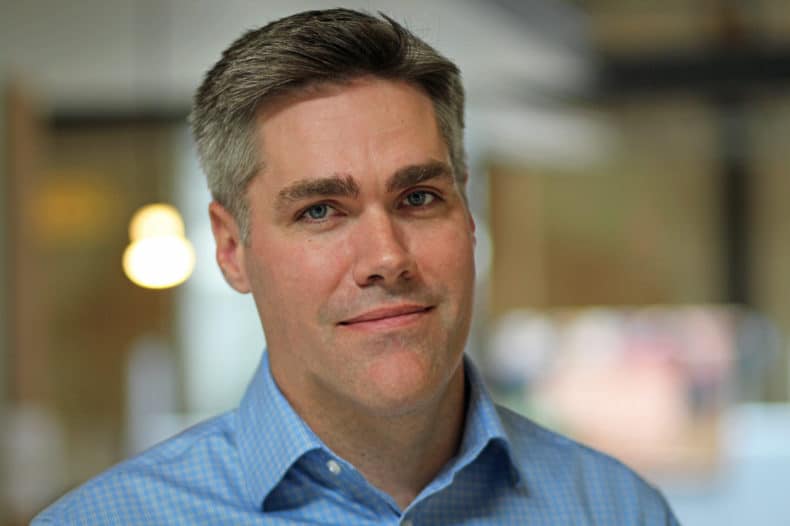by IdeaMensch / As CEO, Matt leads uShip’s executive team in the company’s mission to create the most efficient marketplace for shipping that has ever existed. /
The idea for uShip was hatched in 2001 when Matt moved from Seattle to Austin in a nearly-empty rented moving truck. Inspired by the frustration of the moment, Matt has since turned uShip into a global online transport platform that leverages Internet and mobile technologies to effectively, affordably and automatically connect customer freight with available truck space. In 2012, Matt was named Austin Business Journal Best CEO of 2012 (small company category), and in 2011, he earned top honors in the Austin Under40 business and entrepreneur category. Also in 2011, Matt received the prestigious “Rising Star” Award from the University of Texas, which recognizes the professional success of its extensive network of alumni. In 2010, he was a finalist for Ernst and Young’s Entrepreneur of the Year in Central Texas. Prior to founding uShip, Matt spent five years in business development and engineering roles at The Boeing Company in Seattle, Wash. He helped assess the technical and financial viability of new ventures including broadband in-flight Internet access and a theater ballistic missile defense system. Matt also led the avionics integration effort for the F-22 fighter aircraft and evaluated research proposals for NASA. Matt attended the McCombs School of Business at the University of Texas at Austin where he earned his MBA in May 2004. During business school, while turning the uShip idea into reality, Matt interned for the Austin office of Hunt Ventures where he evaluated new investment proposals. In addition to his MBA, Matt has a Bachelor of Science in Mechanical Engineering from The University of Texas at Austin.
Where did the idea for uShip come from?
It was 2001 and my then-fiancée Heather and I were moving from Seattle to Austin, where I was going to attend business school at UT Austin. We didn’t have that much stuff, so I ordered a 9-foot rental truck. When I got to the rental company, the size I had ordered was sold out, leaving us with a much larger truck. After we filled it with our small batch of stuff, it was still virtually empty. We had this 20-foot truck to make a 2,500-mile drive.
It was during the drive that I got to thinking about my mom, and how she’d asked me a year earlier to help move a family heirloom armoire from Ohio to Houston. I was unsuccessful because of the armoire cost too much to transport. During my drive with Heather, an idea emerged: There had to be a way to connect people who have large things to ship with discounted empty truck space. I bored Heather to tears along the drive. She wasn’t a fan of the idea. Undeterred, I took the idea into business school and I eventually joined up with my two eventual co-founders—Jay Manickam and Mickey Millsap—to bring the idea to life. In 2003, we founded the company and in March of 2004, we launched uShip.com.
What does your typical day look like and how do you make it productive?
No two days are alike at a company like uShip. We find ourselves in that zone between startup and mature company, so a given day can quickly swing from preparing for a board meeting to a ping-pong tournament to determining our company representative at the Austin Startup Games. I might meet with HR about recruiting and head count, and then, later on, get together with people from the company to watch Shipping Wars (the A&E reality show loosely based on our shipping marketplace) on our downtown Austin deck while we enjoy some of my uShip-famous brisket.
To be productive, it’s important to stay as focused as possible, knowing that each thing has its place. I try to keep an eye out for anomalies in our daily data flash report, check the markets and some key newsletters like the Wall Street Journal Logistics Report to keep on top of any significant industry news. As my kids have gotten older, there have more practices and school activities to balance as well.
How do you bring ideas to life?
Ideas we bring to life typically solve a problem or situation that’s either within our current framework or is something we could incorporate into our framework. Once we know those parameters, we put intuition and data against it. The less tangible part of that involves getting teams motivated around a rally point or milestone so that everyone is tackling the project collaboratively. Depending on the idea or thing you’re bringing to life, the team has to employ a certain amount of tenacity and unwillingness to fail. The team almost has to will some ideas into existence, and that drive has to come from the top.
What’s one trend that really excites you?
I’m a huge sharing economy fan. uShip was part of the peer-to-peer sharing economy before it was actually cool. In fact, our first tagline was “Ridesharing for Your Stuff”. We were a forerunner to the multitude of companies participating in collaborative consumption today. What excites me about it is the efficiency it brings – in our case, to shipping of larger items – and the disruption of old-guard industries, whether that’s transportation, hospitality, e-commerce or some other sector.
What is one habit of yours that makes you more productive as an entrepreneur?
I’m told I’m very stubborn – and I really can’t disagree. Tenacity is what helps push you through walls when all you’re hearing is “no.”
What was the worst job you ever had and what did you learn from it?
The absolute worst job I ever had was growing up in Houston working for my best friend’s dad’s concrete additives business. I dealt with caustic chemicals all day long. While I appreciated having the job at the time, and we actually had a lot of fun together doing it, I realized then that I wasn’t necessarily cut out for the industrial world.
If you were to start again, what would you do differently?
I honestly can’t say I’d change a thing. Don’t get me wrong – it’s not that I did everything right. I’ve made my share of mistakes, but missteps, even those “lucky mistakes” along the way, have actually helped get me to where I am today. It has led to contentment around how things have evolved, both personally and professionally. I suppose the trick is recognizing that when things appear to be a mistake, it’s a chance to learn and not make it again.
As an entrepreneur, what is the one thing you do over and over and recommend everyone else do?
Every few years, I feel it’s important to zoom out around the business and almost attack our model like we’re trying to put ourselves out of business, as a competitor might aggressively do. I’ve seen other business leaders do something similar. I feel it’s a really important part of staying on your toes as a business and to figure out what needs to change. If you don’t, someone else definitely will.
What is one strategy that has helped you grow your business? Please explain how.
As a company, we’ve had a consistent theme of “Think Big, Start Small,” inspired by Herb Kelleher of Southwest Airlines. From that company value, we’ve tried to establish success in a certain key area of the business and then leverage that into something bigger. For example, uShip was originally supposed to just serve deliveries within Texas, but our first shipment went to the Midwest for 10x what we projected our average shipment price to be. We knew we were onto something. We’ve since taken that approach with our locations around the world. We slowly started in Canada and then the UK and now we’re localized in 19 countries. Things really work out when you have big aspirations, but focus on small wins.
What is one failure you had as an entrepreneur, and how did you overcome it?
Loyalty is a big thing for me. I can be loyal to a fault. I don’t tend to give up on people and maybe give them too many chances, to my detriment. I’ve needed to learn from that, but generally, I tend to be optimistic that people can change. This is especially true with respect to recruiting.
What is one business idea that you’re willing to give away to our readers?
Imagine a bar of soap that contains SPF, so when you shower, it creates protection from the sun. It would be called The Sun Block – because it’s a block of soap that also blocks the sun. Trust me, it’d be way easier than putting it on kids than once they’re at the beach or park. Still working out the kinks on how to re-apply it.
What is the best $100 you recently spent? What and why?
On an international flight recently, I dropped an extra $100 to upgrade from economy to economy plus. I remember thinking it was the best $100 I’d ever spent. Extra room to sleep comfortably? Priceless.
What software and web services do you use? What do you love about them?
I’m in between executive assistants right now, so have become a religious user of Doodle, an online productivity tool that lets people put meeting times on my personal and professional calendars. The email back and forth is so inefficient, so it saves me a tremendous amount of time.
What is the one book that you recommend our community should read and why?
The Five Dysfunctions of a Team, by Patrick Lencioni, is really considered the Bible for CEOs when it comes to guiding and establishing practical team dynamics. This is especially helpful as companies and leadership teams grow and more personalities are introduced into the mix, beyond the set of co-founders or early core employees.
What people have influenced your thinking and might be of interest to others?
When it comes to uShip, one of the most influential people has been my wife, Heather. On hearing my transportation marketplace idea, she famously said that it was the most stupid idea she’d ever heard. You can watch the reenactment in a spoof trailer for The Social Network we did call The Shipping Network. I joke with her that I’ve spent the last 12-13 years trying to prove her wrong. From a business perspective, I really admire Elon Musk. I love how he goes and solves big problems, is very mission-driven and rallies people to a cause. He’s not afraid to take on established interests. I’ve also been influenced by Bob Kagle of Benchmark Capital. Bob was an early eBay investor and joined our board in 2005 when Benchmark invested in uShip’s Series A round. He’s really preached focus and has helped us tremendously along the way. And Herb Kelleher, as it relates to “Think Big, Start Small,” has influenced me as well.
View original article

